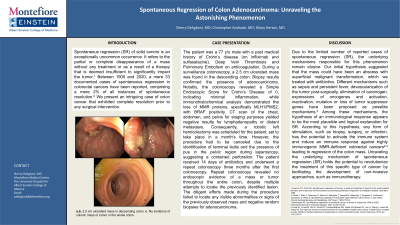Sunday Poster Session
Category: Colon
P0245 - Spontaneous Regression of Colon Adenocarcinoma: Unraveling the Astonishing Phenomenon
Sunday, October 22, 2023
3:30 PM - 7:00 PM PT
Location: Exhibit Hall

Has Audio

Sherry Dehghani, MD
Montefiore Medical Center
New York, NY
Presenting Author(s)
Award: Presidential Poster Award
Sherry Dehghani, MD, Christopher Andrade, MD, Hilary Hertan, MD
Montefiore Medical Center, New York, NY
Introduction: Spontaneous regression (SR) of solid tumors is rare. It involves the disappearance of a mass without treatment or inadequate therapy.1 Only 33 documented cases of spontaneous regression in colorectal cancers have been reported between 1900 and 2020, comprising 2% of all cases.2 We present a unique case of colon cancer that completely resolved before surgery.
Case Description/Methods: The patient, a 77-year-old male with a history of Crohn's disease, DVT, and PE, underwent surveillance colonoscopy which detected a 2.5 cm ulcerated mass in the descending colon. Biopsy confirmed adenocarcinoma, and minimal inflammation indicated by a Simple Endoscopic Score for Crohn's Disease of 0. Immunohistochemical analysis revealed loss of MMR proteins (MLH1/PMS2) with BRAF positivity. Staging CT scan showed no lymphadenopathy or distant metastasis. Robotic left hemicolectomy was scheduled but canceled due to the identification of terminal ileitis and the presence of pus in the pelvic region during laparoscopy, suggesting a contained perforation. The patient received antibiotics for two weeks and a repeat colonoscopy three months later. No evidence of the previously identified mass or tumor was found throughout the colon, despite diligent efforts and negative random biopsies for adenocarcinoma.
Discussion: Due to the limited number of reported cases of spontaneous regression (SR), the underlying mechanisms responsible for this phenomenon remain elusive. Our initial hypothesis suggested that the mass could have been an abscess with superficial malignant transformation, which we treated with antibiotics. Different mechanisms such as sepsis and persistent fever, devascularization of the tumor post-surgically, elimination of carcinogen, expressions of oncogenes and activation, inactivation, mutation or loss of tumor suppressor genes have been proposed as possible mechanisms.3 Among these mechanisms, the hypothesis of an immunological response appears to be the most plausible and logical explanation for SR. According to this hypothesis, any form of stimulation, such as biopsy, surgery, or infection, has the potential to activate the immune system and induce an immune response against highly immunogenic MMR-deficient colorectal cancers2,4 leading to regression of the colon mass. Unraveling the underlying mechanism of spontaneous regression (SR) holds the potential to revolutionize the treatment of this specific type of cancer by facilitating the development of non-invasive approaches, such as immunotherapy.

Disclosures:
Sherry Dehghani, MD, Christopher Andrade, MD, Hilary Hertan, MD. P0245 - Spontaneous Regression of Colon Adenocarcinoma: Unraveling the Astonishing Phenomenon, ACG 2023 Annual Scientific Meeting Abstracts. Vancouver, BC, Canada: American College of Gastroenterology.
Sherry Dehghani, MD, Christopher Andrade, MD, Hilary Hertan, MD
Montefiore Medical Center, New York, NY
Introduction: Spontaneous regression (SR) of solid tumors is rare. It involves the disappearance of a mass without treatment or inadequate therapy.1 Only 33 documented cases of spontaneous regression in colorectal cancers have been reported between 1900 and 2020, comprising 2% of all cases.2 We present a unique case of colon cancer that completely resolved before surgery.
Case Description/Methods: The patient, a 77-year-old male with a history of Crohn's disease, DVT, and PE, underwent surveillance colonoscopy which detected a 2.5 cm ulcerated mass in the descending colon. Biopsy confirmed adenocarcinoma, and minimal inflammation indicated by a Simple Endoscopic Score for Crohn's Disease of 0. Immunohistochemical analysis revealed loss of MMR proteins (MLH1/PMS2) with BRAF positivity. Staging CT scan showed no lymphadenopathy or distant metastasis. Robotic left hemicolectomy was scheduled but canceled due to the identification of terminal ileitis and the presence of pus in the pelvic region during laparoscopy, suggesting a contained perforation. The patient received antibiotics for two weeks and a repeat colonoscopy three months later. No evidence of the previously identified mass or tumor was found throughout the colon, despite diligent efforts and negative random biopsies for adenocarcinoma.
Discussion: Due to the limited number of reported cases of spontaneous regression (SR), the underlying mechanisms responsible for this phenomenon remain elusive. Our initial hypothesis suggested that the mass could have been an abscess with superficial malignant transformation, which we treated with antibiotics. Different mechanisms such as sepsis and persistent fever, devascularization of the tumor post-surgically, elimination of carcinogen, expressions of oncogenes and activation, inactivation, mutation or loss of tumor suppressor genes have been proposed as possible mechanisms.3 Among these mechanisms, the hypothesis of an immunological response appears to be the most plausible and logical explanation for SR. According to this hypothesis, any form of stimulation, such as biopsy, surgery, or infection, has the potential to activate the immune system and induce an immune response against highly immunogenic MMR-deficient colorectal cancers2,4 leading to regression of the colon mass. Unraveling the underlying mechanism of spontaneous regression (SR) holds the potential to revolutionize the treatment of this specific type of cancer by facilitating the development of non-invasive approaches, such as immunotherapy.

Figure: a,b. 2.5 cm ulcerated mass in descending colon. c. No evidence of colonic mass or tumor in the whole colon.
Disclosures:
Sherry Dehghani indicated no relevant financial relationships.
Christopher Andrade indicated no relevant financial relationships.
Hilary Hertan indicated no relevant financial relationships.
Sherry Dehghani, MD, Christopher Andrade, MD, Hilary Hertan, MD. P0245 - Spontaneous Regression of Colon Adenocarcinoma: Unraveling the Astonishing Phenomenon, ACG 2023 Annual Scientific Meeting Abstracts. Vancouver, BC, Canada: American College of Gastroenterology.

